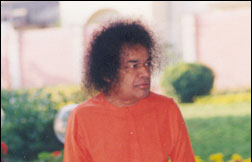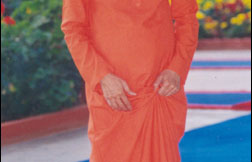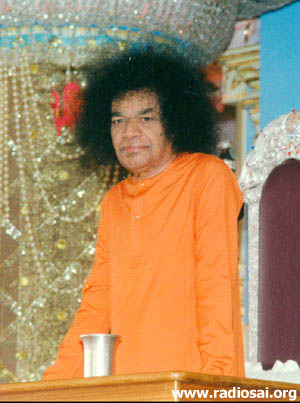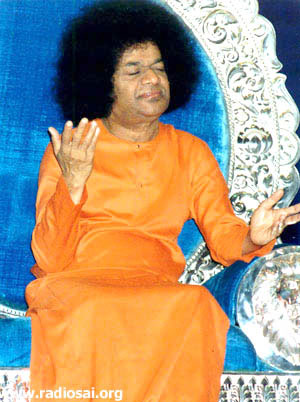| |
SAI: What is your work in America?
H (Hislop): I am retired and do no work.
SAI: Then how do you pass the days?
H: Mostly the day is spent with Swami. It starts with Swami in the morning and goes through the day. I work at my desk trying to make sense out of my financial affairs and then there are many tasks in relation to the house. But really, Bhagavan is our life. Our discrimination, added to by our direct experience, tells us that Baba is God Himself – so what else is there, what else can there be?
SAI: It is a good opportunity for you to study Sai's teachings.
H: Swami must tell me what he wants the Chairman of the Central Committee of America to do. That will be my work now. (This conversation took place in the early 1970s.)
SAI: You will need to do quite a bit of touring, visiting the Sathya Sai Baba Centers. For this, since you are now retired, you should not pay out of your own pocket.
SWAMI'S GUIDANCE TO THE CENTRES
H: I don't worry much about the money. I am a financial idiot and it can only be by Sai's grace that I am not flat broke by now! When I visit Centers, Swami, they will expect discourses. About what shall I talk? |
|
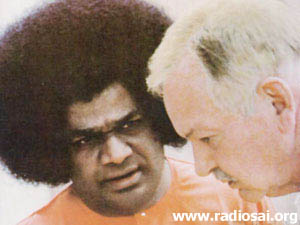 |
| |
|
Dr. Hislop With Bhagawan Baba |
SAI: Speak on the principles of spiritual life. On those things that Swami says are essential to reach God. The spiritual life, such as discipline, devotion, sadhana. Be clear, do your duty calmly, and the goal will be reached in due course.
H: Swami's teaching is clear enough, and that can be said.
SAI: What is needed most now is that the devotees must have tolerance of each other. And they do not have any seasoned discrimination in respect to the many 'gurus' and their various spiritual paths. They have not had the face to face confrontation with Swami that you have had. And you have considerable background in spiritual life and they have not. You must carry them along with you.
H: The new rules for Centers that will be in the guidelines will shake many Centers.
|
|
|
SAI: That will be the case. Sai Centers must reflect the distinctive character of our organization. There cannot be a mixing of a Sathya Sai Baba Center with the many gurus and the many spiritual paths. We have our goal. Swami has shown the path to follow, and we must quietly and sincerely devote ourselves to that path. The leaders must provide the example in their conduct.
H: Not all present Centers devote themselves entirely to the Sai teachings.
SAI: At present, some people form their own organisations and use the Sai Center name as a tool to promote their own interests and ends. Some leaders have a yoga business and use the Sai name as a way to add to the business.
H: What to do about such? Is the prominent leader an exception to the rule? The rule that a leader of a Sai Center cannot carry on yoga classes, or any classes related to spiritual sadhana, and charge the students money?
SAI: Swami is not aware of having exceptions.
H: I understand. The same principle applies to all. Probably such a leader will at once say that entirely apart from their yoga business they will continue to be an Officer of a Sai Center.
SAI: How would that be practical? There would still be the same mixture. Such individuals will have to decide to go one way or the other. Two ways at once will not do. And that will be the case for everyone. Those devotees who wish to determine a separate path for their organizations are quite free to do so.
H: One leader I know has a dual personality. In some cases, the individual is extremely kind-hearted, and in others if a devotee crosses the leader in any way it is 'off with his head' and he is gone from the scene. |
HOW SWAMI CORRECTS PEOPLE
SAI: That is the way of the world. Kindness is used with people. But when people do wrong, they must be corrected sternly. Swami does the same. To those who act according to His command and obey Him He gives everything to fill their wants and needs. But if after a long treatment of love and patience they still disobey, Swami gives severe punishment. He gives it because of His love for the person and because He knows that if He does not punish the person is spoiled.
H: But there is a considerable difference. With Swami it is God Almighty who punishes. Whereas in the other case it is the leader of a Center, a personality who does the punishing.
SAI: Yes, it is as you say. Sai rewards and punishes without self. When humans reward and punish, there is self-interest.
H: Yes, self-interest is there. When the individual of whom I spoke helped some people in trouble with remarkable generosity, the individual put in a stipulation that on the surface was also generous but which resulted in the people repaying the generosity with much service.
SAI: That was all right. The individual helped the people and they should show gratitude. Unless a person can show gratitude to another being at his own level, how can he expect to show gratitude to the divine?
H: To my mind, ingratitude to God is a great sin.
THE FOUR CLASSES OF PEOPLE
SAI: To fail to show gratitude is wrong. To show ingratitude is a sin. There are four classes of people in the world. First, those who call everything they see as good. Second, those who call wrong as wrong and good as good. Third, those who do not make a judgment. In each of these three some reason can be seen. The fourth class is those to whom everyone and everything is evil; they do not see any good.
H: There must be just a few people in this fourth class. Perhaps from the lower socio-economic group?
SAI: On the contrary, it is the largest class of all and it is not a special characteristic of poor people. The poorest peasants often rely on our Indian traditions of thousands of years past and they behave very cautiously. They fear to commit a sin. Poor people who have moved near the cities lose contact with their hereditary background and live in a world which they see as wholly bad. Likewise, the so-called educated middleclass, who are half educated and half ignorant, do not fear sin nor do they believe there is a God and they become sinful, corrupt, immoral, greedy, hateful and so on, and that is their world.
H: As Swami says it, I recollect that in the West those who are corrupt are from the educated middle class who gain positions of wealth, authority, and power. But many workers are also corrupt in their lives and relationships. But in America I do not think the same behaviour and attitude is typical of the upper class. |
|
|
THE REAL MEANING OF UPPER CLASS
SAI: If by upper class you mean those who have a tradition and who are correctly trained by their parents, then the same would be true even of a large number of farmers living in Indian villages.
 |
|
A Visitor: Swami, Mr. X wishes to make a film about the so-called 'lost years of Jesus'. He has much experience in making films and he is a Sai devotee.
SAI: Jesus realized that he was Christ in his 25th year. For eight years following his 16th birthday he travelled in India, Tibet, Iran, and Russia. He was variously regarded as a beggar or as a sannyasi. Jesus had no money. His parents were very poor and practically abandoned him at an early age.
HOW TO SEE GOD IN ALL
H: What is the art of looking whereby one may see the Lord even in unpleasant and disagreeable persons?
SAI: Even in persons of an unpleasant nature, be aware that the Lord is in the heart even of that person. Have that aspect in mind and treat the person from that viewpoint to the best of your ability. In time that person will respond, and his nature will change. One sees people as good or bad because he does not see the person in full but only one side. |
Suppose a mother were six feet tall and her young child could not as yet walk but could only sit on the floor. Will that mother say, 'I am six feet tall when I stand erect. I will not bend myself for the sake of the child'? Or, does she bend down to the child because of her love for the child? As another example, there may be a person with many big degrees who teaches small children; will he refuse to help the children because he knows so much? The children must start to learn by being drilled in the A B C's. They must learn at their level.
HOW TO SEE THE DIVINE
H: Eyes see body. How does one see God Himself?
SAI: In order to see the moon does one need a torch? It is by the light of the moon that one sees the moon. In like fashion, if one wishes to see God, it is by love, which is the light of God, that one may see Him.
H: Swami says that like the blind man who has no eyes to see, we are likewise blind and unable to see our own divinity. With what vision does one see his own divinity?
LOOKING WITHIN TO FIND THE HEART
SAI: A blind man cannot see his body. You can because you have eyes. But you have no eyes to see your spiritual body. You have a spiritual body that is omnipresent. That body can be seen with the spiritual eye.
H: Would Swami describe the spiritual eye?
SAI: Oh, yes. The spiritual eye is God. Attain Him and the spiritual eye will open.
H: What does Swami mean when He says 'To look within oneself'? What is meant by 'look'?
SAI:‘ Looking within does not mean looking into the body of flesh and bones. It means transcending the senses, as in deep meditation.
|
|
|
H: As one turns inward he encounters feeling. Women talk of the heart. Swami puts emphasis on the heart. What is meant by the word, 'heart'?
SAI: 'Heart' is the inside. 'Art' is outside. Heart is inside.
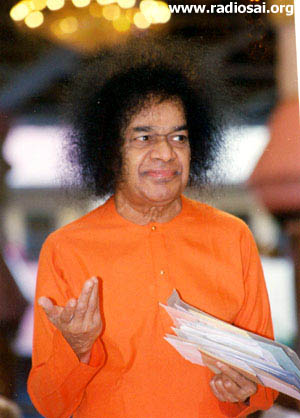 |
|
H: Swami says that 'the heart is the reflection of the Atma.' And also that 'the heart is the best mirror for reflecting truth.' What is that 'heart'? What does Swami refer to?
SAI: Heart is the consciousness.
H: Is the 'heart' that women talk about the same as what Swami means?
SAI: No. That is the subconscious mind mixed up with their desire.
FIND BABA INSIDE
H: Just under my skin, about an inch, there seems to be a mirror. When I see Baba outside, I also see Him in that 'mirror’. The 'mirror' reflects Baba's every move. Of these two, the Baba I see with my two eyes and the Baba of the inside reflection, which is the most real?
SAI: Consciousness is a reflection. If pure it is a clear reflection. It is by the sankalpa of Baba that the reflection is seen.
H: Is it to the inside Baba that prayers and devotion should be addressed?
SAI: When Baba is found within, He will be seen everywhere outside. |
H: When one inquires within, I is found to be I. That 'I' is thought to be oneself. But then it seems to me that 'I' is not me at all, but is Baba.
SAI: That is correct, 'I' is Baba. Have no doubt. You and Baba are one. Not the tendencies and so on, but the essential 'you' and Baba are one and the same. ‘I’ is Baba.
(To be continued)....
– Heart2Heart Team

|
|





